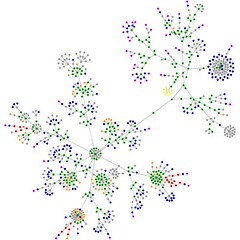SEO Action Plan For The Knowledge Based Semantic Web
| knowledge remix blog as a graph (Photo credit: g.janssen) |
Author : Bharati Ahuja
The Wall Street Journal Post sometime back mentioned in the post that ….” Google is aiming to provide more relevant results by incorporating technology called "semantic search," which refers to the process of understanding the actual meaning of words.” Related to that we had posted our views on http://blog.webpro.in/2012/03/my-views-on-wsj-post-google-gives.html .
After the Panda and Penguin updates, Google on 16th May 2012 announced its Knowledge Graph on a blogpost titled , “Introducing the Knowledge Graph: things, not strings”.
In this article it is explained that :
The Knowledge Graph enables you to search for things, people or places that Google knows about—landmarks, celebrities, cities, sports teams, buildings, geographical features, movies, celestial objects, works of art and more—and instantly get information that’s relevant to your query. This is a critical first step towards building the next generation of search, which taps into the collective intelligence of the web and understands the world a bit more like people do.
Google’s Knowledge Graph isn’t just rooted in public sources such as Freebase, Wikipedia and the CIA World Factbook. It’s also augmented at a much larger scale—because we’re focused on comprehensive breadth and depth.
This is the first step to try to convert an information based engine to a knowledge based engine. This kind of engine is solely based on data and data relationships. Whatever useful information people are searching for offers valuable data for the knowledge graph which can be helpful to others searching on the same topic later.
The search queries help Google to add and correlate data thereby enriching the knowledge based search engine results. The information based search engine takes the string of words from the search query and maps it with the content indexed in the database and displays the sites responding strongly to the ranking factors in the algorithms in the SERPs.
In case of knowledge based search engine an additional dimension of the knowledge factor is added which is determined by the correlation, the relationship and how the content of the site is inter-linked with other entities on the web. This is one way the Knowledge Graph makes Google Search more intelligent. The results are more relevant because the search engine understands these entities, and the nuances in their meaning, the way you do. This makes the search engine think more like the user.
Google says…
“We’ve always believed that the perfect search engine should understand exactly what you mean and give you back exactly what you want. And we can now sometimes help answer your next question before you’ve asked it, because the facts we show are informed by what other people have searched for. “
How does one optimize a site for such a knowledge based search engine?
· Have loads of relevant knowledge rich content in all forms on your site.
· Share that content all over the web so that it gets correlated to the relevant topics and the relevant industry
· Every piece of content on the web is data . How well this data gets indexed and how well It get interlinked is important.
· Represent the following content on the site as microformats or as data :
Reviews
People
Products
Businesses and organizations
Recipes
Events
Video
To check your markup, use the rich snippets testing tool.
· Aim at establishing an authority and brand on social media
· Participate in discussions to put forward your opinion
· Have an active Google+ business page presence
· Use Google+ as a blogging platform
· Do not focus on Guest blogging and blog commenting for link building but post comments and guest blog for sharing your knowledge
· Forget about keywords and focus on the keyness
· Implement the hCard Code for the address on the contact page
· Do not neglect the On Page Optimization as the knowledge quotient will be applicable only if the relevant pages respond to the basic ranking factors.
· Keep improving the Technical aspect of SEO in response to the data received from Webmaster Tools
More relevant information on the following links:
http://blog.webpro.in/2012/03/how-semantic-web-html5-microformats-and.html
http://www.searchenginejournal.com/about-content-inter-linked-data-and-seo/40940/
http://blog.webpro.in/2012/03/how-semantic-web-html5-microformats-and.html
http://blog.webpro.in/2012/04/forget-keywords-and-focus-on-keyness.html
http://blog.webpro.in/2012/01/google-as-complete-blogging-platform.html



<< Home